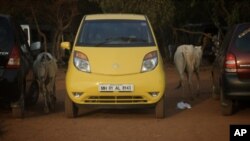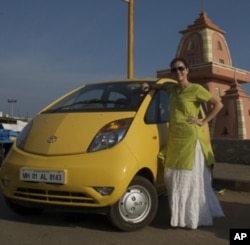Travel throughout India can be quite an adventure. Roads vary from a dusty rock filled trail to a glistening stretch of smooth pavement. Any type of creature is prone to cross a road at any time, the weather can range between some of the coldest and hottest temperatures on the planet, and travelers are likely to encounter a variety of culture and dialects. Recently, a British travel writer set out on a long road trip across India in a vehicle not specifically designed for long distance trips.
With a price tag of about $2,000, the Indian built Nano Tata is currently the least expensive production car available in the world. Vanessa Able is a British travel journalist, and the idea of taking the unique vehicle on a long excursion seemed to be a natural fit.
"When I first started telling people I had intended to drive this car around India, they looked at me as if I was crazy because it is being marketed as a city car. Basically the Nano is not designed for highway driving. And even India has a fantastic stretch of very modern and good quality highways. But there is also an extremely large portion of the country that has roads that are a much lesser quality, they have a lot of potholes, a lot of them are not asphalted to a great degree. And a lot of the time when I was travelling in more rural places, there were some times you are even off roading," she said.
Able planned a three-month, 10,000-kilometer journey. She ended up logging about 13,000 kilometers between February and May 2010, with a swing through India's northwestern region in October after temperatures had cooled. The trip was shared with readers on the internet through blogs that make up The Nano Diaries.
Able says the Nano Tata proved to be more reliable than she had hoped.
"I was actually hoping for more problems because it would make for more exciting report writing as I was writing my blog as I went along. In terms of technical difficulties with the car, I had none. I got three flat tires on extremely bumpy roads. That was the extent of the mechanics I had to deal with," she said.
The Nano Tata was designed to be a low cost replacement for motorbikes and give families in India a safer way to travel. As luck would have it, Able found a model with many extra amenities.
"I happened to get the top model of the most basic car. So mine has features that the basic model would not have in terms of it has air conditioning, it has upholstered seats, it has electric windows, it has features that the most basic model would not have. But it still is a very, very, very basic vehicle," she said.
As a British woman driving this, new small and novel vehicle, Able quickly drew attention wherever she went. Able says most Indians she met were impressed.
"I got a very positive reaction. A lot of Indian people are very, very proud of the fact that Indian industry has managed to produce a vehicle that is being spoken of internationally. That is really saying something about Indian design, Indian technology, Indian industry. And then the fact when they actually see it is sort of being pushed beyond its boundaries too, that people were surprised that it was making [the trip], in the end the road trip came to something like 13,000 kilometers. Most people were sort of in disbelief," she said.
And once she got underway, trepidations of driving across India melted away.
"I went from being very, very tense behind the wheel to sort of being like 'ok, I understand there is sort of a kind of flow here.' And once you get into it, things went much, much easier," she said.
The primary difficulties Able encountered were mostly logistics, including navigating to smaller locations and dealing with the multitude of languages and dialects found throughout India. But as any seasoned traveler knows, unexpected events often provide the most lasting memories.
"I was sort of cruising on this highway. I had just come off a dirt road that I had been on for a very long time, and it is highway and I said 'oh this is fantastic, I will reach my destination very soon.' There was no traffic and then I kept driving and driving and driving. And I was beginning to wonder why there was no traffic. There was this big pile of rubble on the side of the road that thankfully slowed me down. And I slowed down enough to understand that within about 20 meters of where I was, the road just ended. They were actually building a bridge that they were meeting from both sides. There was no actual stop signs or anything to make you aware of the fact that the road was about to end and there was something like a 10 meter plunge down from there. So I slammed on my brakes within about 10 meters probably or maybe even less before there was this sheer drop and the road just ended," she said.
A big trip highlight for Able included a big visitor.
"There was a guy passing through. He was riding an elephant. And I was very taken aback to see this huge elephant. So I stopped. And I think the elephant was more fascinated with the Nano than I was with the elephant. But I had the windows down and the elephant came over and he put his trunk kind of inside the car. And at first I thought 'Oh that is cute. There is an elephant putting his trunk inside my car.' But then he really started coming in. He put the full force of his trunk inside to the point where it was kind of scary. He was sort of going for my stuff like he was going through my bag. I was kind of wrestling with him. And what I never realized is that elephants have extremely runny noses. And he covered the inside of my car with this sort of elephant slime that it took me quite a long time to clean up afterward when I finally managed to reach a place that had water and rags," she said.
The elephant was not the only animal to greet Able along the way.
"You will sort of be driving along and then you suddenly find yourself in the midst of a crowd of goats, [cattle] crossing the road. You just have to respect that. You kind of slow down and you understand you are sharing the road with all creatures, goats, bullocks, dogs very often too. You slow down, you are respectful, you stop and you let them pass and then you continue," she said.
Now based in Pondicherry, India, Able is turning her journey into a book. Her Nano Diaries website has photos, videos and narratives of the trip and recent travels with her small car.
The Journey Part 1
View Nano Diaries - Route Map in a larger map
The Journey Part 2
View Nano Diaries - Route Map in a larger map







